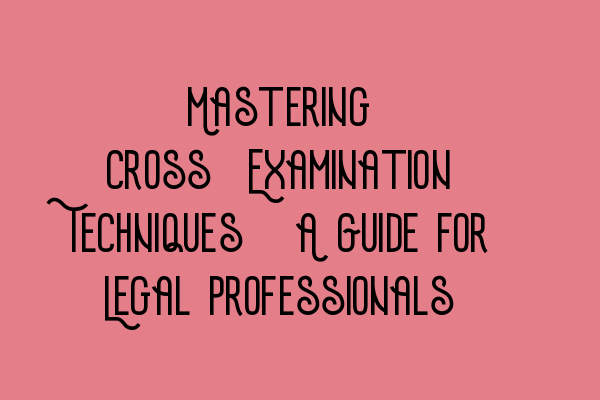Mastering Cross-Examination Techniques: A Guide for Legal Professionals
As legal professionals, one of the most crucial skills we must develop is the art of cross-examination. It is during cross-examination that we have the opportunity to test the credibility and reliability of witnesses, challenge their version of events, and ultimately advocate for our clients with precision and effectiveness.
In this comprehensive guide, we will explore various cross-examination techniques that every legal professional should master. By incorporating these techniques into your practice, you can enhance your ability to gather relevant information, expose weaknesses in opposing witnesses’ testimonies, and ultimately strengthen your case.
1. Preparation is Key
Before jumping into the courtroom, thorough preparation is crucial. Familiarize yourself with the facts of the case, review witness statements, and identify key areas of contention. This will allow you to craft a well-structured cross-examination that addresses the important issues and presents them in a logical manner.
For effective preparation, consider enrolling in SQE 1 Preparation Courses to enhance your knowledge and understanding of fundamental legal principles. These courses provide comprehensive materials and mock exams that will help you excel in cross-examination techniques.
2. Setting the Stage
When cross-examining a witness, it is essential to establish credibility and control from the outset. Start by introducing yourself courteously and clearly. Maintain a confident and professional demeanor throughout the process, keeping in mind that the jury is watching your every move.
Utilize open-ended questions to encourage witnesses to provide detailed and informative responses. By allowing them to speak at length, you create opportunities to extract valuable information or expose inconsistencies in their testimony.
3. Utilize Leading Questions
Leading questions play a crucial role in cross-examination. These are questions that suggest the desired answer and are phrased in a way that does not allow the witness to provide lengthy explanations.
For example, instead of asking, “What did you see on the night of the incident?” a leading question would be, “You witnessed the defendant committing the crime, isn’t that correct?” By incorporating leading questions strategically, you can control the direction of the testimony and highlight key points that support your case.
4. Listen and Adapt
Active listening is paramount during cross-examination. Pay close attention to the witness’s responses, body language, and any cues that may indicate inconsistencies or potential opportunities to challenge their credibility.
If you encounter unexpected answers or the witness begins to contradict themselves, be ready to adapt your line of questioning on the spot. This flexibility ensures that you make the most of each cross-examination opportunity and do not miss critical points that could influence the outcome of the case.
5. Establishing Impeachment
One of the primary goals of cross-examination is to impeach the witness’s credibility. When a witness contradicts themselves or provides false information, it is crucial to confront them with prior statements or evidence that undermines their testimony.
Through comprehensive preparation, you can identify weaknesses in the witness’s claims and assemble a collection of relevant evidence. By skillfully presenting this evidence during cross-examination, you can erode the witness’s credibility and create doubt in the minds of the jury.
6. Maintain Control and Professionalism
Throughout the cross-examination process, it is essential to maintain control and professionalism. Avoid personal attacks or aggressive behavior towards the witness, as this can undermine your credibility and negatively impact the perception of the jury.
By staying calm, composed, and respectful, you project confidence and authority. This approach enhances your effectiveness as an advocate for your client and increases the likelihood of achieving a favorable outcome.
For further guidance on legal skills and preparation for the SQE exams, explore these related articles:
- SQE 1 Practice Exam Questions
- SQE 1 Practice Mocks FLK1 FLK2
- SQE 2 Preparation Courses
- SQE 1 Preparation Courses
- SRA SQE Exam Dates
Cross-examination is an essential skill for any legal professional. By mastering the techniques outlined in this guide and utilizing the resources available, you can enhance your advocacy skills and achieve success in the courtroom. Remember, preparation, control, and professionalism are the keys to effective cross-examination.
